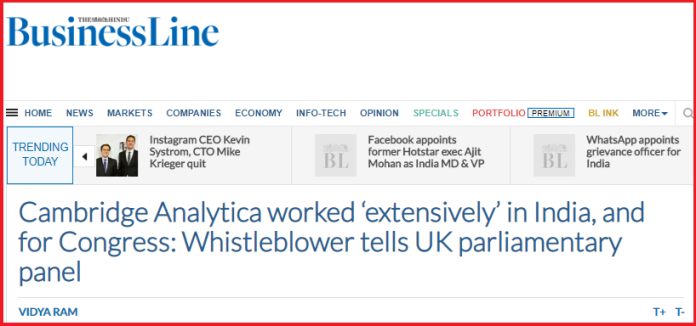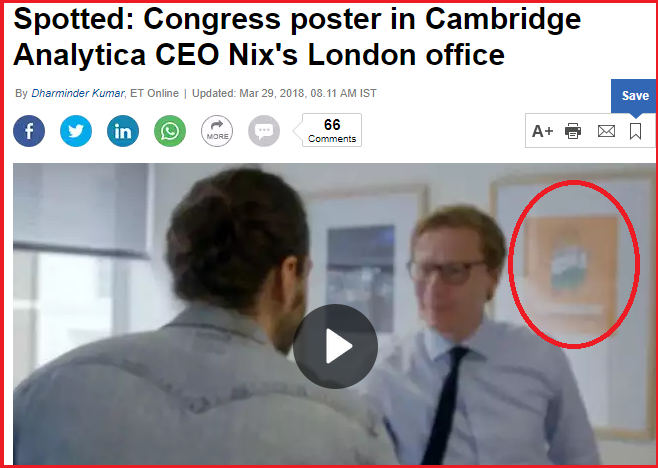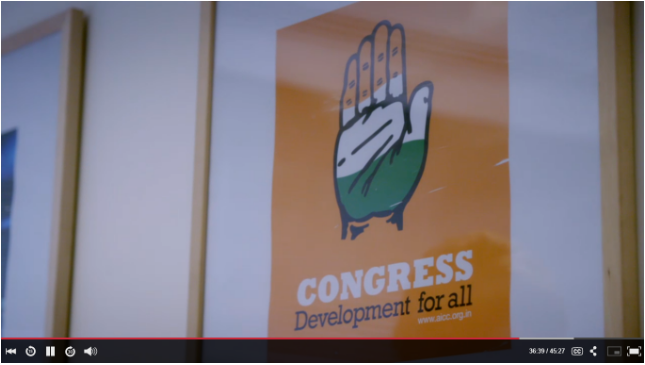The historic Supreme Court verdict on Aadhaar is finally out. And with it, the matter of data protection and privacy is back in the public debate. And while data privacy is a something very serious, I can tell you which people are not serious.
Those would be the entire food chain of Aadhar privacy hawks, starting from the lowly social media trolls to the furious talking heads on TV and all the way to ‘activist lawyers’ of Lutyens Delhi who file the same case over and over again.
There is a simple litmus test to spot these anti-Aadhaar trolls (from social media to mainstream media to lawyers). If they are not talking about Cambridge Analytica, they are just trolls. They don’t care about data protection and/or privacy. At best they are mindless critics, out to stop Aadhaar simply because Modi seized upon it as a key tool to clean up the system. At worst, they are in the pay of vested interests who find their settled fiefdoms to be under threat from the very same cleanup.
Now, the concept of data theft, which stems from the idea of “data as property” is somewhat new and deserves to be explained in simple words. Let me make a humble attempt to do just that.
Simply put, what is property? Several thousand years ago, the only possible property you could own were things like land, cattle, crops, pieces of gold and silver, etc.
Then, as human society grew more complicated, more sophisticated notions of a property had to be defined and protected. For example, if you wrote a book or a poem, no one else could claim it as theirs. If you came up with an idea for a new technology, no one else could profit from it without your permission. This was ‘intellectual property’. And in order to protect intellectual property, copyright laws and patent laws were born.
Today, the modern world has given rise to another new notion of property: that of your personal data. This not only includes your name and age but also your personal preferences: what you like to eat, what you like to watch, where you like to travel. Everything that makes you the person that you are.
And this information is very valuable in a commercial sense. For example, online shopping websites would love to know about your choices in clothes, books, electronics and so on. It is not hard to see that a political party would want to know how you think so that they can deliver tailor-made messages to you.
This is the concept of ‘your data as your property.’ Platforms such as Facebook, where users put out large quantities of their personal information, therefore claim publicly that they will not allow unauthorized harvesting of your data by third parties. They say that ‘data is the new gold.’
Which is what makes the Cambridge Analytica scandal so serious. A shady corporation harvested from Facebook the personal data of hundreds of millions of users. And we will probably never know exactly how many people had their data stolen and who exactly this data was sold to.
So how is it that India’s anti-Aadhar volunteer army never spoke about Cambridge Analytica? The Aadhaar consists of giving your name, age and biometric data to our democratically elected government. The benefits of Aadhaar in cutting out waste/theft from welfare schemes and its use as an anti-corruption tool couldn’t be more obvious.
None of these upsides is present in the case of the Cambridge Analytica scandal. The amount of data that people put out on Facebook is several orders of magnitude bigger than anything they have given for Aadhaar. We all know (lots of) people who put out every little detail of their lives on Facebook and many of us might be guilty of it ourselves. And all this data might have been stolen by a shady foreign corporation who might have sold it to anyone.
What did the anti-Aadhaar troll army here in India say about Cambridge Analytica? Silence.
You might remember that there were some initial absurd efforts to link BJP to Cambridge Analytica by means of some son or daughter of some BJP ally. But then just as the big details of the story came out in hearings before the UK Parliament, the Cambridge Analytica story vanished completely.
Could this have been the reason why?

This seems to have been the precise moment when Indian media lost all interest in the Cambridge Analytica story.
Even a picture of a clearly visible Congress election symbol in Cambridge Analytica CEO’s office which was found in a 2017 BBC Documentary failed to revive media interest in the story.

The story had everything. The video grab was for everyone to see. It couldn’t have been more prominent.

And yet, somehow the media still managed to lose interest in the story.
We will never know if Cambridge Analytica actually stole data for the Congress Party. I guess we will just have to accept the possibility that the CEO of Cambridge Analytica randomly puts up in his office posters of organizations that he is not dealing with in any way.
Just the way we will have to accept that Cambridge Analytica has now closed down, it’s owners have voluntarily destroyed their mountain of data goldmine, given up all worldly possessions and gone into the forest in search of enlightenment. We will never know.
What we do know, however, is how our domestic data privacy warriors behaved about the whole Cambridge Analytica scandal the moment the name of the Congress came up.



